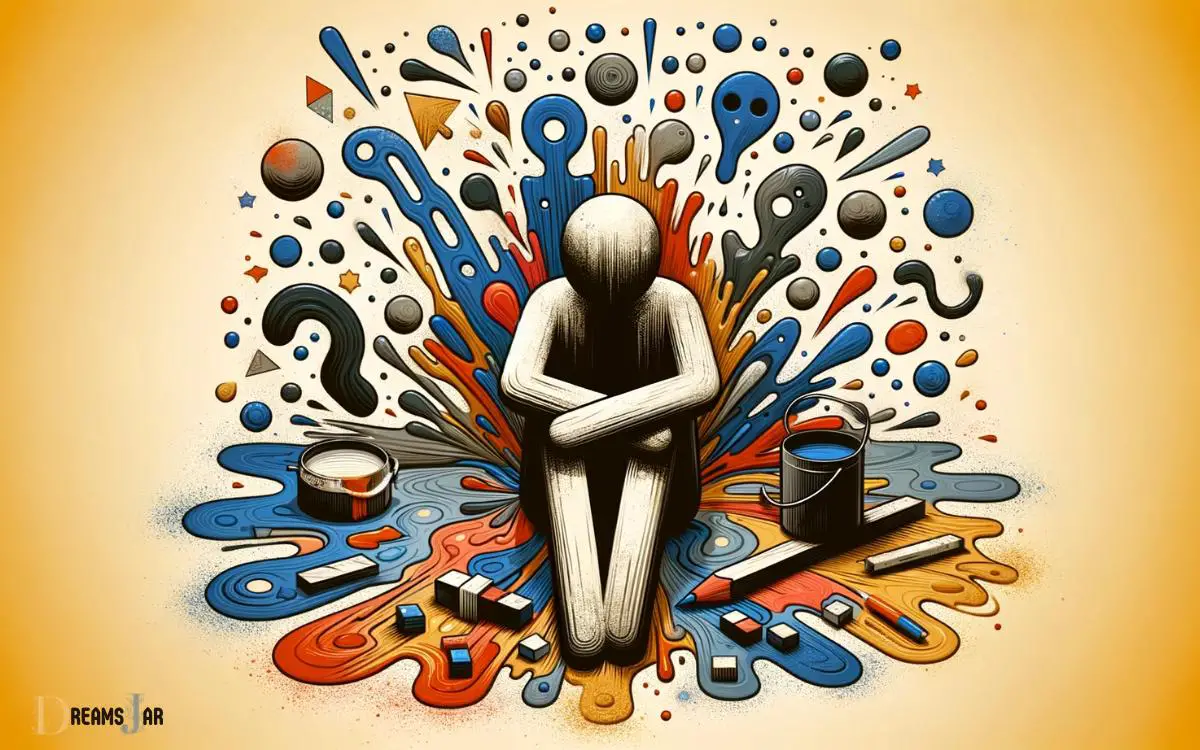Stepping in Dog Poop Dream Meaning: Fear of Errors!
Stepping in dog poop in a dream symbolizes unresolved feelings, fear of errors, and the requirement for effective communication and setting limits in relationships.
It’s a metaphor that allows for a deeper self-understanding, leading to personal growth and fulfillment.
In dreams, symbols can reveal profound insights into our subconscious. Stepping in dog poop, though not a pleasant experience, carries significant connotations.
It represents:
For instance, if you’re anxious about a new job, you might dream of stepping in dog poop, symbolizing your fear of making a mistake.
Dreams are unique personal journeys, providing insight into our deepest selves. Stepping in dog poop in a dream, while unpleasant, can reveal valuable lessons about our emotions and relationships.

Key Takeaway
The Subconscious Mind and Dream Symbolism
The Subconscious Mind plays a significant role in the interpretation of dream symbolism. Dreams are often considered windows into the subconscious, offering insight into our deepest desires, fears, and emotions.

- Symbolism in dreams serves as a language of the subconscious, communicating its messages through metaphors, archetypes, and allegories.
- The subconscious mind uses symbols to convey complex ideas and emotions that may be difficult to express directly.
- Each symbol holds a unique meaning, influenced by personal experiences, cultural backgrounds, and collective unconscious.
- Through the analysis of dream symbolism, individuals can gain a deeper understanding of their subconscious thoughts and feelings.
It allows for self-reflection, introspection, and the exploration of hidden aspects of the psyche.
Unresolved Emotions and Feelings

Unraveling the hidden layers of our dreams, we are confronted with the presence of hidden emotional triggers.
These triggers, deeply embedded within our subconscious, hold the power to unveil unconscious emotional patterns that dictate our waking lives.
Hidden Emotional Triggers
Hidden emotional triggers can deeply impact our subconscious minds, often manifesting as unresolved emotions and feelings.
These triggers act as catalysts, stirring up buried memories and unprocessed experiences, demanding our attention and healing.
To better understand the profound influence of hidden emotional triggers, let us explore a table that depicts some common triggers and their corresponding manifestations:
| Hidden Emotional Trigger | Manifestation |
|---|---|
| Abandonment | Fear of rejection and avoidance of close relationships |
| Betrayal | Difficulty trusting others and low self-esteem |
| Loss | Grief, sadness, and a sense of emptiness |
| Humiliation | Shame, insecurity, and a fear of being judged |
| Rejection | Low self-worth, fear of intimacy, and social isolation |
Unconscious Emotional Patterns
Unresolved emotions and feelings can manifest as unconscious emotional patterns. These patterns, often deeply ingrained within our psyche, can influence our thoughts, behaviors, and relationships without our conscious awareness.
They can arise from past experiences, traumas, or unresolved conflicts, shaping our perception of ourselves and the world around us. Understanding and identifying these patterns is crucial for personal growth and healing.
Here are three common unconscious emotional patterns:
- Repetitive Relationship Dynamics: We may find ourselves repeatedly attracting and engaging in unhealthy relationships, mirroring unresolved emotional patterns from our past.
- Self-Sabotage: Unconscious emotional patterns can lead us to undermine our own happiness and success, often rooted in feelings of unworthiness or fear of failure.
- Emotional Triggers: Certain situations or interactions can evoke intense emotional reactions that seem disproportionate to the present circumstance, indicating unresolved emotional wounds.
Fear of Making a Mess or Mistakes

The fear of making a mess or mistakes is a common human experience, rooted in our desire for control and perfection.
This fear often stems from a fear of failure and can lead to perfectionist tendencies and anxiety about the consequences of our actions.
It is important to recognize and address this fear, as it can hinder personal growth and prevent us from taking risks and pursuing our goals.
Fear of Failure
A common fear among individuals is the apprehension of making a mess or mistakes, often causing a significant amount of anxiety and distress.
This fear of failure stems from a deep-rooted desire for perfection and the fear of negative consequences. It can manifest in various aspects of life, such as work, relationships, and personal goals.
Here are three reasons why the fear of failure can be paralyzing:
- Self-imposed expectations: Individuals may set unrealistically high standards for themselves, fearing that any deviation from perfection will result in failure and disappointment.
- Fear of judgment: The fear of failure can be intensified by the worry of what others might think or say if mistakes are made. This fear of judgment can lead to a lack of confidence and a reluctance to take risks.
- Missed opportunities for growth: By avoiding situations that may result in failure, individuals deny themselves the chance to learn from their mistakes and develop resilience. This fear can hinder personal growth and limit potential opportunities.
Understanding and addressing the fear of failure is essential for personal and professional growth.
By recognizing and challenging these fears, individuals can embrace the learning process, cultivate resilience, and ultimately achieve success.
Perfectionist Tendencies
Individuals with a fear of making a mess or mistakes often exhibit perfectionist tendencies, striving for flawless outcomes in various aspects of their lives.
This fear stems from a deep-rooted desire to avoid any semblance of imperfection or failure.
These individuals meticulously plan and execute tasks, often spending an excessive amount of time and energy to ensure that everything is done perfectly.
| Pros | Cons |
|---|---|
| Attention to detail | Fear of taking risks |
| High standards | Perfectionism can be paralyzing |
| Constant self-improvement | Overlooking the value of learning from mistakes |
As perfectionism becomes a way of life, it can lead to anxiety about the potential consequences of making a mistake. This anxiety often stems from a fear of failure, disappointment, or the disapproval of others.
Anxiety About Consequences
Experiencing an overwhelming sense of anxiety about the potential consequences of making even the slightest mistake can be a common occurrence for those who harbor a fear of making a mess or mistakes.
This anxiety stems from a deep-rooted fear of the negative outcomes that may result from their actions.
To better understand this fear, here are three key aspects to consider:
- Fear of judgment: Individuals with this anxiety often fear being judged by others for their mistakes or messes, leading to a constant need for validation and approval.
- Perfectionism: The fear of making mistakes is closely tied to a perfectionist mindset, where any deviation from perfection is seen as a failure.
- Lack of self-confidence: Those who fear making mistakes often struggle with low self-confidence and a negative self-image, fueling their anxiety about potential consequences.
Overcoming this anxiety requires self-compassion, acceptance of imperfections, and a willingness to embrace mistakes as learning opportunities.
It is essential to cultivate a growth mindset that values progress over perfection and acknowledges that mistakes are an intrinsic part of the learning process.
Communication and Boundaries in Relationships

When it comes to relationships, effective communication and clear boundaries are essential for maintaining a healthy dynamic.
- Just like avoiding stepping in dog poop, establishing and maintaining boundaries in relationships helps to prevent messy situations and misunderstandings.
- Communication serves as the leash that connects two individuals, allowing them to understand each other’s needs, desires, and limits.
- It is through open and honest communication that trust and intimacy are fostered, creating a solid foundation for a thriving relationship.
- Boundaries, on the other hand, act as the fence that defines personal space and protects individual autonomy.
- They enable individuals to express their unique identities while respecting the boundaries of their partners.
- By establishing and respecting boundaries, individuals can navigate relationships with respect and understanding, avoiding potential conflicts and promoting a healthy connection.
Need for Self-Care and Personal Hygiene

Maintaining a regular self-care routine and practicing good personal hygiene is crucial for preserving one’s physical and emotional well-being within relationships.
Taking care of oneself not only promotes a sense of self-worth and confidence but also enhances the overall quality of interactions with others.
Here are three key reasons why self-care and personal hygiene are essential:
- Symbolic Cleansing: Engaging in personal hygiene rituals can symbolize a release of negative energy and a purification of the self. It allows individuals to shed the burdens of the day and embrace a fresh start, both physically and emotionally.
- Analytical Reflection: Self-care provides an opportunity for introspection and self-reflection, allowing individuals to identify and address their own needs and boundaries. This self-awareness helps in establishing healthier and more balanced relationships.
- Interpretive Connection: Practicing good personal hygiene demonstrates respect for oneself and others. It signifies an understanding of the importance of maintaining a clean and healthy environment, fostering a sense of connection and consideration within relationships.
Conclusion
The dream symbolism of stepping in dog poop highlights the importance of addressing unresolved emotions, setting boundaries in relationships, and practicing self-care.
It serves as a reminder to let go of negativity and move forward in life. By analyzing our dreams, we can gain insight into our subconscious mind and uncover hidden messages that can guide us towards personal growth and fulfillment.
So, the next time you find yourself stepping in dog poop in your dreams, remember to clean up the mess and embrace the lessons it brings.






